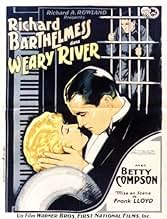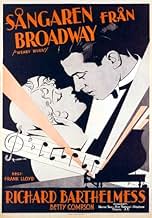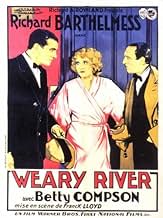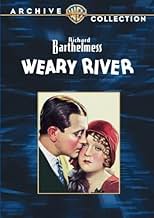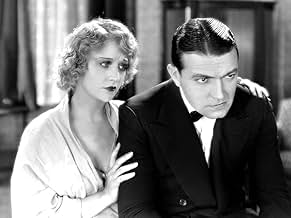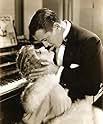Adicionar um enredo no seu idiomaA gangster is put in prison, but finds salvation through music while serving his time. Again on the outside, he finds success elusive and temptations abound.A gangster is put in prison, but finds salvation through music while serving his time. Again on the outside, he finds success elusive and temptations abound.A gangster is put in prison, but finds salvation through music while serving his time. Again on the outside, he finds success elusive and temptations abound.
- Direção
- Roteiristas
- Artistas
- Indicado a 1 Oscar
- 2 vitórias e 1 indicação no total
George E. Stone
- Blackie
- (as George Stone)
Ray Turner
- Elevator Boy
- (as Raymond Turner)
Ernie Adams
- Ex-Con in Alley
- (não creditado)
Brooks Benedict
- Jerry's Guest
- (não creditado)
Ruth Cherrington
- Actress Backstage Who Locks Her Door
- (não creditado)
James Conaty
- Attorney at Trial
- (não creditado)
Richard Cramer
- Prison Radio Announcer
- (não creditado)
Oliver Cross
- Restaurant Patron
- (não creditado)
Edwards Davis
- Prison Chaplain
- (não creditado)
Sally Eilers
- Hatcheck Girl
- (não creditado)
Jim Farley
- Plainclothesman with Sergeant
- (não creditado)
Sherry Hall
- Prison Phone Operator
- (não creditado)
Chuck Hamilton
- Prison Photographer
- (não creditado)
Avaliações em destaque
"Weary River" is what you might call a transitional style movie from Warner Brothers/Vitaphone. While it's not truly a full talking picture since much of it is silent and uses intertitles, some of it is sound--a bit of the dialog and the songs. This is exactly what they did previously with "The Jazz Singer" and by 1929, they'd finally be making all sound pictures. So, many of the films from the studio in 1928 would be like this...providing enough sound to please the masses...for now.
Jerry (Richard Barthelmess) is a gangster, though he dresses nice and doesn't look or sound like one. His life of crime eventually catches up to him and he's sent to prison. The warden of the place is an odd one--very progressive for the time and dedicated to fixing the cons who can be fixed. As for Jerry, he's initially dubious but soon finds a niche leading the prison's orchestra and writing music. He's so successful that he eventually becomes a radio sensation and one of his songs is a hit. Soon, he's released from prison. However, there's a strong pull from his old life--and when he finds out who set him up, he's mad enough to kill. What's next? And, how does the old warden enter the picture?
This film suffers a bit here and there because the movie is a tad overly melodramatic. And, the story wraps up too quickly and easily. Still, for the time, it's a very good picture and worth your time.
Jerry (Richard Barthelmess) is a gangster, though he dresses nice and doesn't look or sound like one. His life of crime eventually catches up to him and he's sent to prison. The warden of the place is an odd one--very progressive for the time and dedicated to fixing the cons who can be fixed. As for Jerry, he's initially dubious but soon finds a niche leading the prison's orchestra and writing music. He's so successful that he eventually becomes a radio sensation and one of his songs is a hit. Soon, he's released from prison. However, there's a strong pull from his old life--and when he finds out who set him up, he's mad enough to kill. What's next? And, how does the old warden enter the picture?
This film suffers a bit here and there because the movie is a tad overly melodramatic. And, the story wraps up too quickly and easily. Still, for the time, it's a very good picture and worth your time.
Turner Classic Movies presented "Weary River" in March of 2003 as part of its month of Oscar. I found it intriguing, even enjoyable. Partly because it was half-silent and half-sound, I was intrigued, since I have a deep and abiding interest in the earliest films. I enjoyed it for that reason, and because the story itself was, at the very least, pleasant, if not totally believable and realistic. Betty Compson, who played Alice, had a remarkably cute way of speaking, and whenever she called to her lover Jerry, played by Richard Barthelmess, she pronounced it "Jer-wy," which I found endearing. Great cinema? Perhaps not, but one I would like to see again, if only to prove to myself whether Barthelmess did his own singing. And to watch and hear the adorable Betty Compson.
The years 1928 to 1930 were perhaps the crappiest couple of years in movie history. This is the period during which films transitioned from silent to sound and the learning curve was steep for most. "Weary River" is one of the better transitional films, as it actually feels like a movie and not a sound stage-bound play.
This film is actually part silent and part sound, though the ratio is about 80/20 talking to silent. Richard Barthelmess and Betty Compson prove themselves to be decent talking actors, though neither went on to have substantial careers in the new medium. The material they're given is still of the melodramatic silent movie kind, so they can only do so much with it. But the film bucks some of the trends that make other early talkies such bores. For one, the camera actually moves, whereas most early talkies find the actors standing in one spot with a stationary camera planted squarely in the middle of the frame. Also, this film has nearly constant underscoring like a silent film would have, which reduces the amount of dead air that plagues many early sound films and causes them to have such stilted pacing. The silent/sound hybrid is weird to watch -- there's no narrative reason for some parts to have titles while others are spoken -- but it's like the fact that this film couldn't quite commit to being a complete talkie made it a better sound film than it would otherwise have been.
The title of the film comes from a song that Barthelmess's ex-con character makes famous and that launches his reformed life as a radio singer, a song which I hope you like because Barthelmess warbles it in its entirety for what feels like a dozen times.
"Weary River" was one of three films that brought Frank Lloyd a Best Director Oscar nomination in the 1928-29 award year, the other two being "The Divine Lady" and "Drag." This was a weird year for Oscar. Technically, there weren't any nominations; at the awards ceremony, only winners were announced in each category. I'm not sure how people knew to show up for the ceremony if they weren't officially nominated, but that's something to figure out some other day I guess. But historical documents have since suggested what films were being considered in each category, and "Weary River" was included in Best Director. Frank Lloyd did win, but he won only for "The Divine Lady," as it seems that, though an artist could be nominated for multiple films, the voters were able to show preference for what film actually went with the award.
A bit of trivia -- Lloyd was only the second and last person to win a Best Director Oscar for a film not also nominated for Best Picture (Lewis Milestone was the first, for "Two Arabian Knights" from the previous year, though the first Oscar ceremony included two Best Director awards, one for dramatic films and one for comedies, so it's no an exact comparison).
Grade: B-
This film is actually part silent and part sound, though the ratio is about 80/20 talking to silent. Richard Barthelmess and Betty Compson prove themselves to be decent talking actors, though neither went on to have substantial careers in the new medium. The material they're given is still of the melodramatic silent movie kind, so they can only do so much with it. But the film bucks some of the trends that make other early talkies such bores. For one, the camera actually moves, whereas most early talkies find the actors standing in one spot with a stationary camera planted squarely in the middle of the frame. Also, this film has nearly constant underscoring like a silent film would have, which reduces the amount of dead air that plagues many early sound films and causes them to have such stilted pacing. The silent/sound hybrid is weird to watch -- there's no narrative reason for some parts to have titles while others are spoken -- but it's like the fact that this film couldn't quite commit to being a complete talkie made it a better sound film than it would otherwise have been.
The title of the film comes from a song that Barthelmess's ex-con character makes famous and that launches his reformed life as a radio singer, a song which I hope you like because Barthelmess warbles it in its entirety for what feels like a dozen times.
"Weary River" was one of three films that brought Frank Lloyd a Best Director Oscar nomination in the 1928-29 award year, the other two being "The Divine Lady" and "Drag." This was a weird year for Oscar. Technically, there weren't any nominations; at the awards ceremony, only winners were announced in each category. I'm not sure how people knew to show up for the ceremony if they weren't officially nominated, but that's something to figure out some other day I guess. But historical documents have since suggested what films were being considered in each category, and "Weary River" was included in Best Director. Frank Lloyd did win, but he won only for "The Divine Lady," as it seems that, though an artist could be nominated for multiple films, the voters were able to show preference for what film actually went with the award.
A bit of trivia -- Lloyd was only the second and last person to win a Best Director Oscar for a film not also nominated for Best Picture (Lewis Milestone was the first, for "Two Arabian Knights" from the previous year, though the first Oscar ceremony included two Best Director awards, one for dramatic films and one for comedies, so it's no an exact comparison).
Grade: B-
Frank Lloyd was Oscar nominated for this film & two others, in 1929, about a gangster imprisoned, who becomes a singer...singing endlessly throughout the film the title song.
It's part silent-part talkie...which makes me think that this had been originally shot as a silent and then some portions of it where re-shot with dialogue, a usual thing to be done back in 1929.
A rare chance to watch William Holden, the elderly character actor (no relation to the star of Sunset Boulevard) of late silents and early talkies, who's very, very fine as the warden of the prison, in which gangster Richard Barthelmess is locked up. Barthelmess is good as Jerry Larrabee and Betty Compson (although her voice sounds a little bit high-pitched-maybe due to technical shortcomings)is fine too, as her girlfriend.
Thanks again to TCM, for the opportunity of watching another "rarity", not seen for a long time (completely restored, as best as possible).
It's part silent-part talkie...which makes me think that this had been originally shot as a silent and then some portions of it where re-shot with dialogue, a usual thing to be done back in 1929.
A rare chance to watch William Holden, the elderly character actor (no relation to the star of Sunset Boulevard) of late silents and early talkies, who's very, very fine as the warden of the prison, in which gangster Richard Barthelmess is locked up. Barthelmess is good as Jerry Larrabee and Betty Compson (although her voice sounds a little bit high-pitched-maybe due to technical shortcomings)is fine too, as her girlfriend.
Thanks again to TCM, for the opportunity of watching another "rarity", not seen for a long time (completely restored, as best as possible).
I am a fan of early talkies.I have seen many but none quite like this.The first reel is silent,the second sound,the third starts off silent then 3 minutes in sound comes in.For the rest of the film,silent and sound constantly interchange.Was this supposed to be an experiment.Was it started as a silent picture.Were they short of sound apparatus some of the time?Why didn't they just make one sound and one silent version?We shall never know.I actuallybfound it quite entertaining even if I got fed up listening to Weary River.
Você sabia?
- CuriosidadesThe film is part silent, with intertitles, and part sound, which was important to feature the main character's talent as a singer, although the title song Weary River was nevertheless dubbed by a professional singer. One scene near the end features an orchestra playing on-screen on set that is a radio studio, while traditional silent movie sound is substituted for real sound. Then the scene technology audibly changes to sound recorded on film, with the same orchestra appearing to play for real (possibly dubbed) as the main character begins to sing (although he is listed as dubbed) in a radio performance that prompts his sweetheart to call the radio studio. The scene is an unusual mix of technologies during a period of transition from silents to sound.
- Erros de gravaçãoWhen Jerry Larrabee is brought in to the prison bathroom, there is already an inmate having a bath, who has disappeared before the scene is over.
- Citações
Prison Warden: Oh, I know how you feel. But, things won't be half as bad if you'll only play ball with us.
- Versões alternativasFirst National also released this film in a silent version.
- Trilhas sonorasWeary River
(1929)
Music by Louis Silvers
Lyrics by Grant Clarke
Sung by Richard Barthelmess (dubbed by Johnny Murray)
Principais escolhas
Faça login para avaliar e ver a lista de recomendações personalizadas
Detalhes
- Data de lançamento
- País de origem
- Idioma
- Também conhecido como
- Weary River
- Locações de filme
- Empresa de produção
- Consulte mais créditos da empresa na IMDbPro
- Tempo de duração1 hora 26 minutos
- Cor
- Proporção
- 1.33 : 1
Contribua para esta página
Sugerir uma alteração ou adicionar conteúdo ausente

Principal brecha
By what name was Regeneração (1929) officially released in India in English?
Responda
